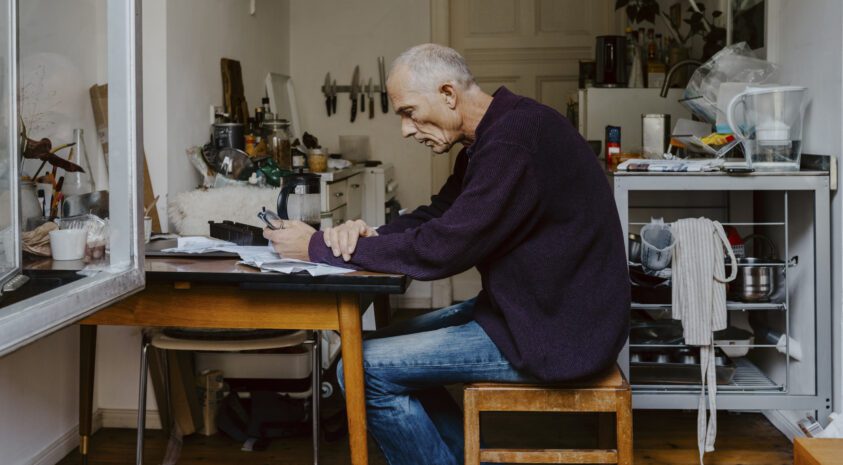You walk into your aging parents’ home and almost trip over a pile of clutter. “I haven’t gotten out much lately,” your mom says. She seems tired and she hasn’t been answering your calls. And — you look at her more closely — has she lost weight?
May is Mental Health Awareness Month, which makes this the perfect time to check in with the senior adults in your life. Unfortunately, many older adults struggle with depression, and they’re less likely to admit their feelings or symptoms so they can receive proper treatment. Here, we’re breaking down some of the most common signs of depression in senior adults as well as a few ideas you can try to help.
Depression Among Senior Adults
According to the CDC, estimates show that:
- 1%-5% of older people have major depression
- 5% of older people who need home healthcare have major depression
- 5% of older people who are hospitalized have major depression
Depression is not a normal part of growing older. It is a medical condition that can be treated.
Types of Depression
The National Institute of Mental Health explains there are several types of depression that can affect older adults:
- Major depressive disorder. This includes symptoms lasting at least two weeks and interferes with a person’s ability to perform daily tasks.
- Persistent depressive disorder. Here, feelings of depression last over two years, but the person may still be able to conduct daily activities.
- Depressive disorder due to a medical condition. This type of depression stems from a physical medical condition.
- Seasonal affective disorder. Usually, SAD symptoms appear in the late fall or early winter and go away by the time spring or summer rolls around.
- Substance or medication-induced depressive disorder. Some depression is related to the use of substances like pain medication or alcohol.
Common Signs of Depression in Senior Adults
In older adults, warning signs of depression might include:
- Persistent feelings of sadness or numbness
- Feelings of hopelessness or worthlessness
- Irritability or restlessness
- Loss of interest in activities that once were pleasurable
- Isolation from friends and family
- Decreased energy; moving more slowly
- Difficulty concentrating, remembering, or making decisions
- Difficulty sleeping, or oversleeping
- Neglecting basic hygiene
- Eating more or less than usual
- Thoughts or death; suicide attempts
It’s also worth noting that someone who has experienced depression as a younger adult is more prone to feeling depressed in their later years. However, older adults are more likely to not mention their symptoms or to “handle it themselves” rather than looping in a health professional.
How to Help A Senior Adult With Depression
Keep an eye on your aging parents, family members, or any other older adults in your life. If you’re noticing signs of potential depression, don’t be afraid to approach them and say, “I’ve noticed lately that you haven’t been getting out as much as usual. Are you eating and sleeping okay? Is there anything you want to talk about?”
Likewise, if you hear a senior adult in your life say they feel sad or empty, take them seriously. Here are a few additional ideas you can use to help.
Please keep in mind, the following advice is not intended to replace therapy or psychiatric care. If you feel that you or your loved one needs is suicidal and/or a danger to yourself or others, please call 911 or visit your nearest emergency room immediately.
Help Schedule Medical Appointments
Ask your loved one if they’d be open to seeing a doctor (such as their primary care provider) to discuss what they’ve been feeling. Help them schedule the appointment. Offer to give them a ride there, and to be a supportive presence in the room if needed. Therapy can also be an extremely helpful outlet to cope with depression. Many therapists offer telehealth sessions that can be done from the comfort of home.
Encourage Social Connection
Feelings of loneliness and isolation are common in retirement, and these feelings can drive more serious health conditions, including depression. Look into local resources such as a senior center, library, or religious institution that might have opportunities for senior adults to connect. Neighbors, hobbies, and technology are additional avenues that could help senior adults create and maintain a feeling of community. For example, the Friendship Line is a “warmline” that people 60+ can call for non-emergency emotional support.
Maintain Healthy Habits
Encourage your loved one to eat a balanced diet and get regular physical activity (assuming they don’t have any medical conditions that prevent them from doing so). Offer to cook a new recipe with them, or invite them to go for a walk or play tennis together. The added benefit of spending time together in the fresh air can help promote happier feelings, too.
We’re here for you!
Bankers Life is here to help customers with their financial and insurance needs so please visit us at BankersLife.com to learn more.



